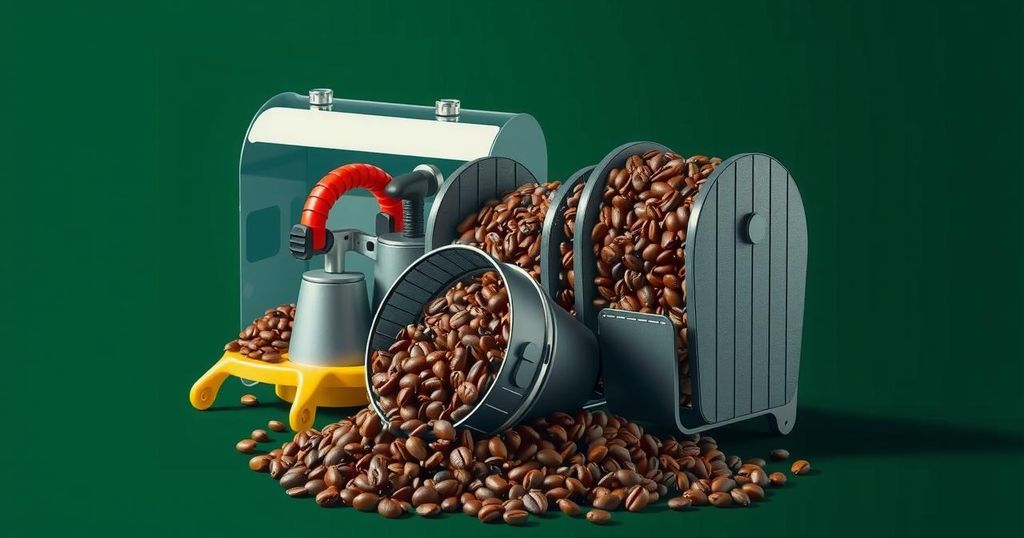Innovative Solutions Emerge to Tackle Coffee Waste in the UK

The UK coffee sector generates significant waste through disposable cups and ground coffee, with some companies developing sustainable solutions like the ButterflyCup, repurposing used coffee grounds, and creating compostable coffee pods to address environmental concerns. Consumer participation will be vital for these innovations to succeed.
In the United Kingdom, coffee consumption reaches approximately 35 billion cups annually, generating significant environmental challenges. The nation disposes of over 2.5 billion disposable coffee cups each year and contributes around 500,000 tonnes of ground coffee waste to landfills. In response, certain coffee companies are proposing innovative strategies to mitigate these issues, aligning with the UK government’s pledge to achieve carbon neutrality by 2050. One notable solution is the ButterflyCup, a fully paper-based cup devoid of plastic coating or a conventional lid. Developed by Irish entrepreneurs, this cup can be sealed by simply folding it after pouring the beverage. Tommy McLoughlin, co-creator of the ButterflyCup, asserts, “We believe it is the world’s most environmentally friendly disposable cup.” Despite being slightly pricier than standard plastic cups, it is more affordable than compostable options with separate lids. While the cup is recyclable, it faces challenges in contamination concerns, but it can also biodegrade or be composted. The coffee industry’s carbon footprint extends to plastic packaging used for transporting coffee, as well as the disposal of used coffee grounds, which generate greenhouse gases such as methane. Rich Riley, co-CEO of Origin Materials, emphasizes the need for a significant shift towards sustainable goods, stating, “It’s a kind of ‘once-in-a-planet’ transition we’re looking at, from fossil-based [goods] to sustainable ones.” In London, a small company named Ernie is addressing the issue of single-use plastics in coffee transport by utilizing an electric milk float for deliveries in reusable, recyclable containers. Although the company’s operations were affected by the pandemic, it continues to adapt by shifting its business model to cater to individual customers rather than businesses. Furthermore, the UK company bio-bean is converting waste coffee grounds into bio-fuel logs, collected from cafes and restaurants, thereby creating an environmentally friendly alternative to wooden logs. The process involves decontaminating and compressing the grounds into sellable logs. Additionally, other companies are innovating by repurposing coffee grounds—such as Finnish company Rens that manufactures sneakers from coffee grounds mixed with recycled plastics. Moreover, the rising popularity of single-use coffee pods has prompted manufacturers to develop compostable options. Such pods can now be disposed of together with their contents in an industrial composting system, promoting a circular economy. The efforts of these companies indicate a growing trend towards sustainable practices within the coffee industry, yet the ultimate success will depend on consumer willingness to adopt these changes. Mr. Riley concluded with optimism regarding consumer trends towards sustainable alternatives, asserting, “In our experience customers very much want to embrace the circular economy.”
The increasing coffee consumption in the UK poses serious environmental challenges, particularly relating to waste generated by disposable coffee cups and used coffee grounds. With millions of cups ending in landfills, the coffee industry is under scrutiny to find sustainable solutions that align with the government’s carbon neutrality goals by 2050. Innovative products like the ButterflyCup, alongside strategies to repurpose used coffee grounds and embrace new transportation methods, reflect an evolving approach towards sustainability in this sector.
In summary, the UK coffee industry is undergoing a transformative phase aimed at reducing its environmental impact. By adopting innovative products like the ButterflyCup and developing sustainable practices for used coffee grounds, companies are taking proactive steps to address the challenges posed by waste and carbon emissions. Consumer engagement in these initiatives will be crucial in determining the overall success of such sustainability efforts.
Original Source: www.bbc.com








